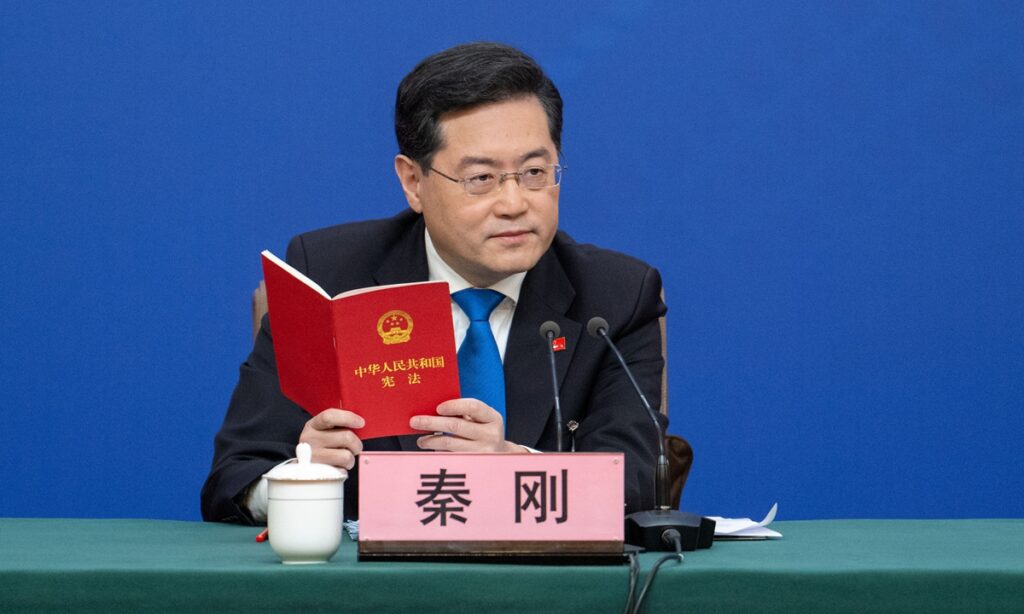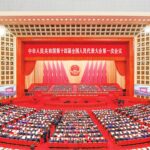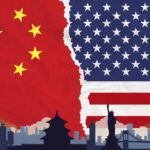Chinese Foreign Minister Qin Gang on Tuesday held a press conference on the sidelines of the Two Sessions, and by answering questions from reporters from China and foreign press, Qin comprehensively introduced China’s diplomacy on the new journey and covered topics about China’s relations with Russia, the US, the EU, as well as hot spot issues like the Ukraine crisis and the Taiwan Straits situation.
Answering 14 questions from the media, the new Chinese foreign minister is sending a message of friendship and cooperation to the world, and also shows firm stance to oppose and fight hegemony, presenting a Chinese diplomacy style of wisdom, justice seeking, and sense of humor. Chinese analysts said the press conference is an important opportunity for the outside world to learn more about China’s diplomacy in the next stage, and how and why China would deal with some significant hot spot issues that are of concern to the whole world.
“This year is the first year to fully implement the principles of the 20th National Congress of the Communist Party of China (CPC),” Qin said at the conference. The 20th CPC National Congress has drawn up a top-level design for China’s diplomacy, defined its missions and tasks, and made strategic arrangements.
As China’s domestic COVID-19 situation turns for the better, China has steadily resumed exchanges with foreign countries, and China’s diplomacy has pressed the “acceleration button” and sounded the clarion call, said the foreign minister.
Qin introduced some of China’s major diplomatic activities in 2023, saying “China will follow the guidance of head-of-state diplomacy and ensure the success of two major diplomatic events that the country will host, the first China-Central Asia Summit and the third Belt and Road Forum for International Cooperation, to show the distinctive character of China’s diplomacy.
China-US relations
It is worth noting that China-US relations were still the focus of Chinese and foreign media at the press conference. In addition to questions directly on China-US relations, on other questions such as the Taiwan question, the Ukraine crisis, China-Russian relations, China-European relations, the ASEAN, or even the Belt and Road Initiative, there are also factors of China-US times. Experts said this once again demonstrated that China-US relations are highly significant and of global influence, adding the US is also the one that created the most waves and storms for China’s voyage.
Li Haidong, professor at the Institute of International Relations at the China Foreign Affairs University, told the Global Times on Tuesday that Qin actually pointed out the crux of China-US relations and many issues related to it. “The US cannot let other countries take medicine for its own disease.”
Seeing China as its main rival and the biggest geopolitical challenge, the US’ China policy, like placing wrong the first button on a shirt, has largely deviated from a rational and healthy path, Qin said.
US rhetoric of “establishing guardrails” and “not seeking conflict” simply means China should not respond in words or action when slandered or attacked. “That is just impossible,” he said.
If the US does not hit the brake but continue to speed down the wrong path, no amount of guardrails can prevent derailing and there will surely be conflict and confrontation,” Qin said.
Analysts said it’s unclear whether decision-makers in Washington understand the dangerous trend mentioned by Qin or not, since the US shows almost no sincerity to stop such trend. If they keep provoking China’s redlines, the conflict will get more and more likely.
Qin also made remarks on one of the most untouchable redlines – the Taiwan question. With a copy of the Constitution of the People’s Republic of China in his hands, Qin read two sentences in the preamble before answering the related question: “Taiwan is a part of the sacred territory of the People’s Republic of China. It is the sacred duty of all the Chinese people, including our fellow Chinese in Taiwan, to achieve the great reunification of the motherland.”
Russia-Ukraine conflict
China’s partnership with Russia is another crucial bilateral relationship of global significance, and Qin made thorough introduction and explanations about the China-Russia ties in the new era.
China and Russia have found a path of major-country relations featuring strategic mutual trust and good neighborliness. The China-Russia relationship is not a threat to any country, nor is it subject to any interference or discord sown by any third party, Qin said. “The more unstable the world becomes, the more imperative it is for China and Russia to steadily advance their relations.”
Cui Heng, an assistant research fellow from the Center for Russian Studies of East China Normal University, told the Global Times on Tuesday that “When the US manipulates some of its allies to form bloc confrontation and worsen the security situation for the world, it’s truly important for China and Russia to coordinate and cooperate in the international arena to restrain US hegemony and ensure the general peace of Eurasia.”
Answering a question from the Global Times about some Western countries’ hype that China could provide weapons for Russia or the notion that only China can end the Ukraine crisis, Qin said that China is not the creator of the crisis, nor a party directly concerned. “What has China done to deserve being blamed, or even sanctioned and threatened? This is absolutely unacceptable.”
Zhang Hong, an associate research fellow at the Institute of Russian, Eastern European and Central Asian Studies of the Chinese Academy of Social Sciences, told the Global Times on Tuesday that the Ukraine crisis is the trouble of Europe, of Russia and of the West, not of China. But as a major country and a permanent member of UN Security Council, China is willing to offer help and has been actively promoting negotiations and political settlement, he noted.
“China has a moral responsibility on the Ukraine crisis but not legal obligation to resolve the conflict between Russia and Ukraine. We won’t accept any smear campaign and tactics of shifting the blame or unilateral sanctions,” Zhang said.
Qin said at the conference that “Some countries view China-Russia relations through the lens of Cold War alliances; they see nothing but their own image.”
Image of China’s diplomacy
The Tuesday press conference is the first important occasion for Qin, since becoming foreign minister, to show the world his personal style, and Li Haidong grasped a sense of humor from Qin’s responses.
Qin answered a question about Western media’s claims on China’s “Wolf-Warrior Diplomacy.”
“I remember when I first went to the US as the ambassador, the American media exclaimed that the ‘Chinese Wolf Warrior has come!’ When I returned to become the foreign minister, I was not given that title (from the US media). I really feel like I’ve lost something,” Qin quiped.
There is no shortage of kindness and goodwill in China’s diplomacy, but in face of “jackals or wolves,” Chinese diplomats would have no choice but to confront them head on to protect the motherland, he said.
A Beijing-based expert on international relations who asked for anonymity said that “if some foreign journalists don’t understand who are ‘wolves and jackals,’ they can find answers from searching questions like who blames China of so-called ‘Wolf-Warrior Diplomacy’ and who keeps stigmatizing China with fake news and rumors, and who unfairly and illegally contain China’s development with sanctions, and who provokes China by encouraging separatists on the island of Taiwan.”
(Global Times)




